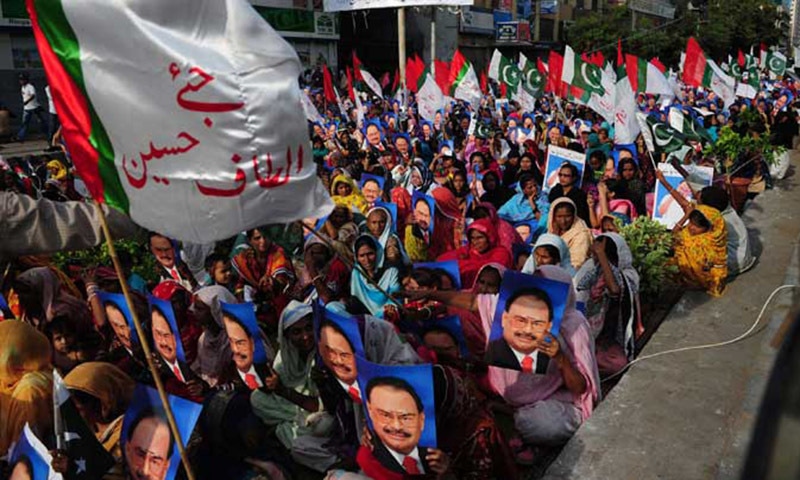The Urdu press often uses a very powerful political idiom – lamha-i-fikriya – to characterise the challenges facing a given party or leader in moments of grave crises. It is precisely this kind of situation in which the Muttahida Qaumi Movement (MQM) finds itself today.
The Rangers’ pre-dawn raid on its headquarters – the famous or infamous Nine Zero – is not an isolated event in the MQM’s decades-long story of traumas, vicissitudes, electoral triumphs and tragic, even humiliating, falls to depths from which many thought it would not be able to recover.
One such trauma was the military crackdown on its “walls” and “bastions” in June 1992, some five months after its founder and supremo, Altaf Hussain, tipped off by the then Sindh Chief Minister Jam Sadiq Ali, chose to self-exile himself to Britain.
While the crackdown led to a split in the party, giving rise to Haqiqi, the MQM showed a surprising degree of resilience to re-emerge as a political force in a manner that evoked unfathomable contempt, fear and hatred as much as it bewildered and confounded its supporters and opponents.
As time passed, the MQM came to symbolise two vital elements of power – political strength based on votes and the power to drive terror into the hearts of its enemies – and not only enemies.
Today, the MQM’s subterranean establishment is an empire in itself, its sources of finance, firepower, recruitment, training and intelligence-gathering as varied and arcane as those of Tupamaros. It also has acquired the ability to be in government and opposition at the same time, and there is hardly any provincial or federal government which it didn’t share power with – only to fall out, return, and walk out again to make a somersault.
Often, it appeared the party existed only for its own sake – except in rare moments, like when Mustafa Kamal the mayor astounded the people by building Karachi’s infrastructure at a stunning pace.
What now?
Will the MQM survive Wednesday’s raid?
Maybe it will, but with a vastly reduced ability to sway urban Sindh, Karachi particularly, the way it wants. Its vote bank has been steadily shrinking, but it still retains hardcore supporters and workers.
The big question is how Altaf Hussain will use this extant asset. How long will telephonic ‘khitaabs’ and remote-controlled leadership keep the party afloat?
There are three obvious decisions which have been long overdue.
One: the MQM should join the provincial government and earnestly goad and motivate its cadres into working for the welfare of the people of Karachi irrespective of ethnic considerations. Mustafa Kamal showed the way. This can be replicated.
Two: it should stop recourse to snap strikes which bring urban Sindh to a halt and cause panic and resentment among millions of people, especially parents and hapless students. It should know snap strikes, even if you couch them in the harmless nomenclature of Youm-i-Sog, are the single biggest cause of resentments against the party.
Three: it is time Altaf Hussain devolved powers to those in the trenches. The leaders and cadres here are at the receiving end, they know the issues at hand, have their fingers on the right pulse and can guess the people’s mood and what they want. They are therefore in a better position to chalk out realistic policies and face their voters.
Watching TV in London and getting feedback from loyalists are hardly the way to run a political party that all said and done still has pockets of support. There is no more appetite among the people for the periodic farce when Altaf announces retirement and takes the decision back on “popular demand”.
Give real power to the party cadres and those in the trenches.
The horizons for the party will darken further if the investigation into the Imran Farooq murder case finds the missing link. It may then be too late to devolve or regret.
This is, to wit, the MQM’s lamha-i-fikriya.














































